The Lithuanian Council for Culture has invited the cultural community to its annual forum, "The Power of the Creator". The forum examined the situation of creators from various angles, including their daily work experiences and challenges, collaboration with organisations, the significance of public investment, and attitudes toward creators. What would it take to empower creators and make artistic activities their full-time job? Journalist Indrė Kaminckaitė moderated the forum.
Investments in creators promote societal well-being and foster innovation.
In the first part of the forum, Sverre Fossen, Head of Art Economy and Innovation at Arts and Culture Norway, discussed empowering and funding creators. He noted that their institution was allocated 8.8% of the government’s cultural budget, amounting to €211 million. Out of this total, in 2024, the institution has allocated €43.5 million to individual artists. In 2023, the institution received over 11,000 applications and provided funding to 1,008 of them. Six types of grants were awarded, covering working, younger, established and senior creators, along with grants catering to the various needs of creators. Fossen argues that these grants are crucial incentives not only for maintaining a high level of artistic excellence and investing in creators and their careers, but also for ensuring societal well-being, promoting social cohesion, and fostering innovation. Creators play a significant role in both conveying and challenging the norms and values of society. He emphasised that all of these aspects are crucial for strengthening democracy.
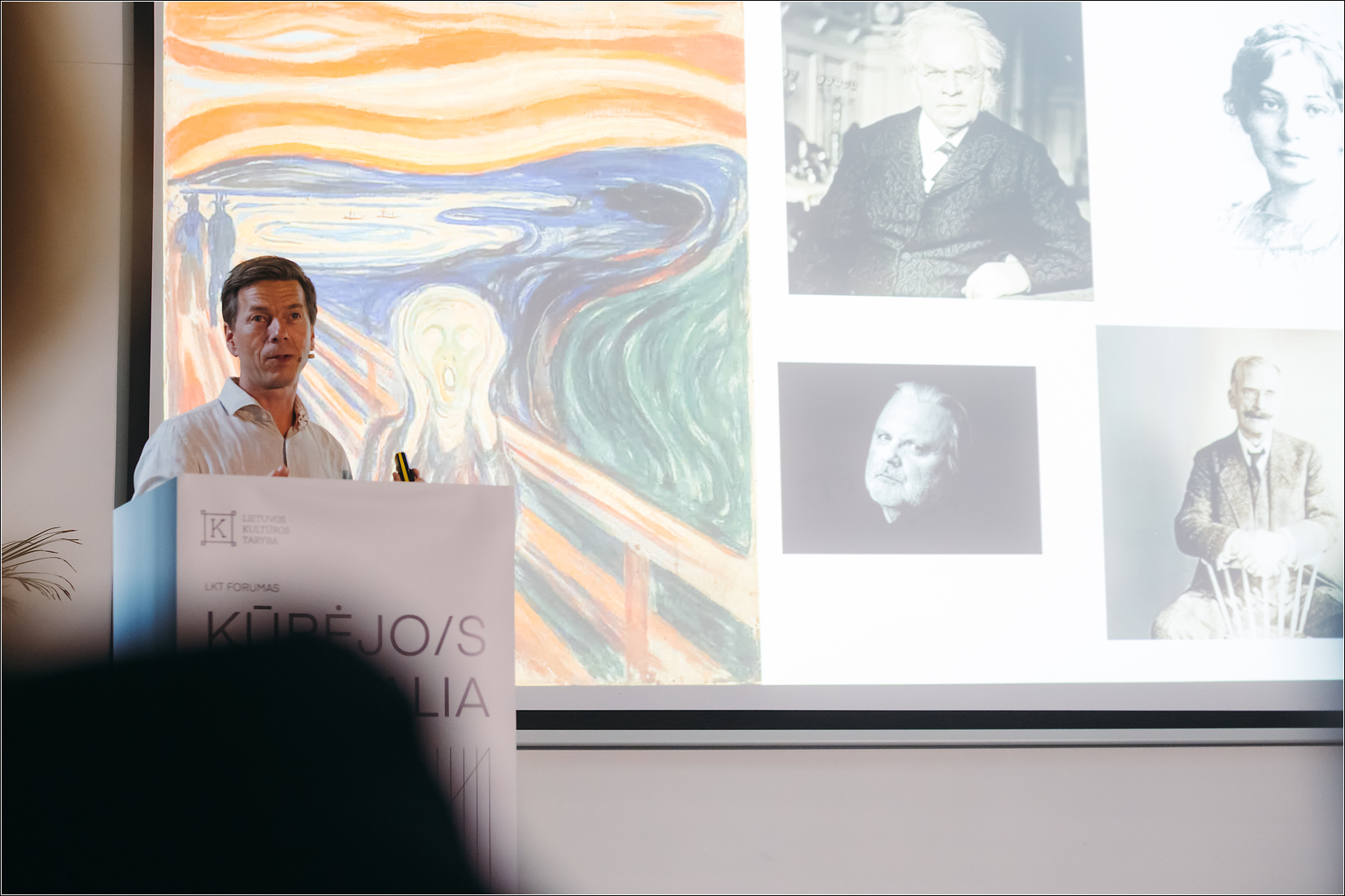
LCC Forum 2024. Photo by V. Budrys
Marija Pečiulytė, Adviser at the Division of Monitoring and Analysis of the Lithuanian Council for Culture, examined how project developers used funding from the Council and discussed the remuneration provided to creators. An analysis of financial expenditure in 2023 reveals that project developers allocated the majority of their funds towards implementing creative ideas rather than supporting the organisations themselves. While financial reports submitted to the Lithuanian Council for Culture often indicate low remuneration for creative work — for instance, 75% of creators receive up to €1,000 across all artistic fields except dance — there are also significant fluctuations and discrepancies noted. The total average cost of creative work amounted to approximately one-third of the total funds allocated by the Lithuanian Council for Culture.
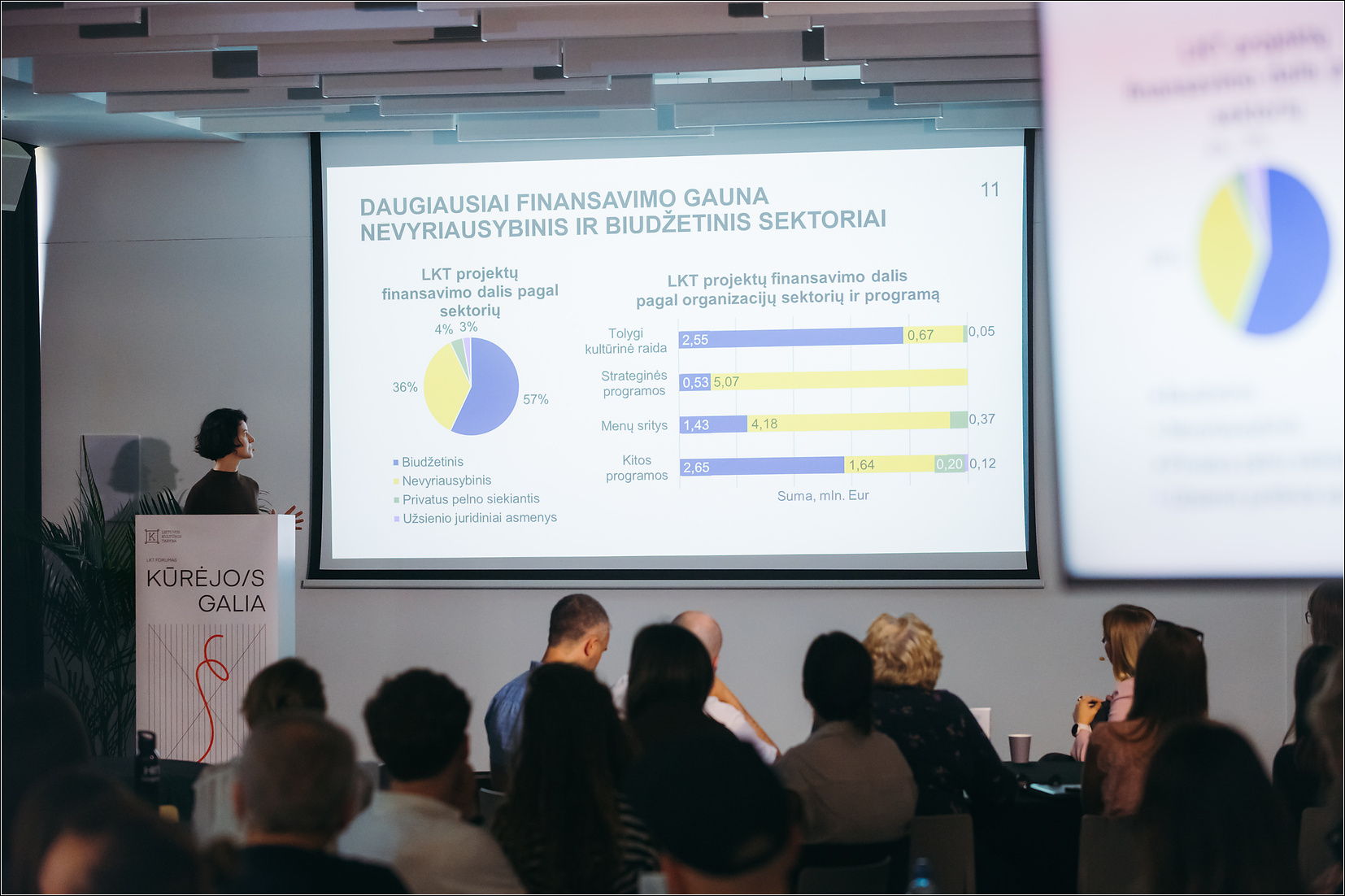
LCC Forum 2024. Photo by V. Budrys
The cultural community’s expectations include long-term grants, increased trust in creators, and publicly available outcomes from previous projects
In the second part of the forum, members of the cultural community voiced their expectations, discussed the significance of local artists, freedom of expression, the potential of the Council’s grants, the criteria for evaluating applications, and methods to ensure fair compensation for creativity.
In the discussion on fair remuneration for creativity, participants suggested that creators’ associations could establish a tariff system—a publicly defined framework for creators’ remuneration. They also proposed systemic changes to promote education, aiming to enable creators to learn about market dynamics, pricing their work, and efficiently preparing commercial proposals. Participants also noted that project applications to the Lithuanian Council for Culture should include provisions for remunerating the creators. Participants also suggested to follow the example of Arts Council England and implement undercover audiences to monitor and evaluate the success of artists’ projects.
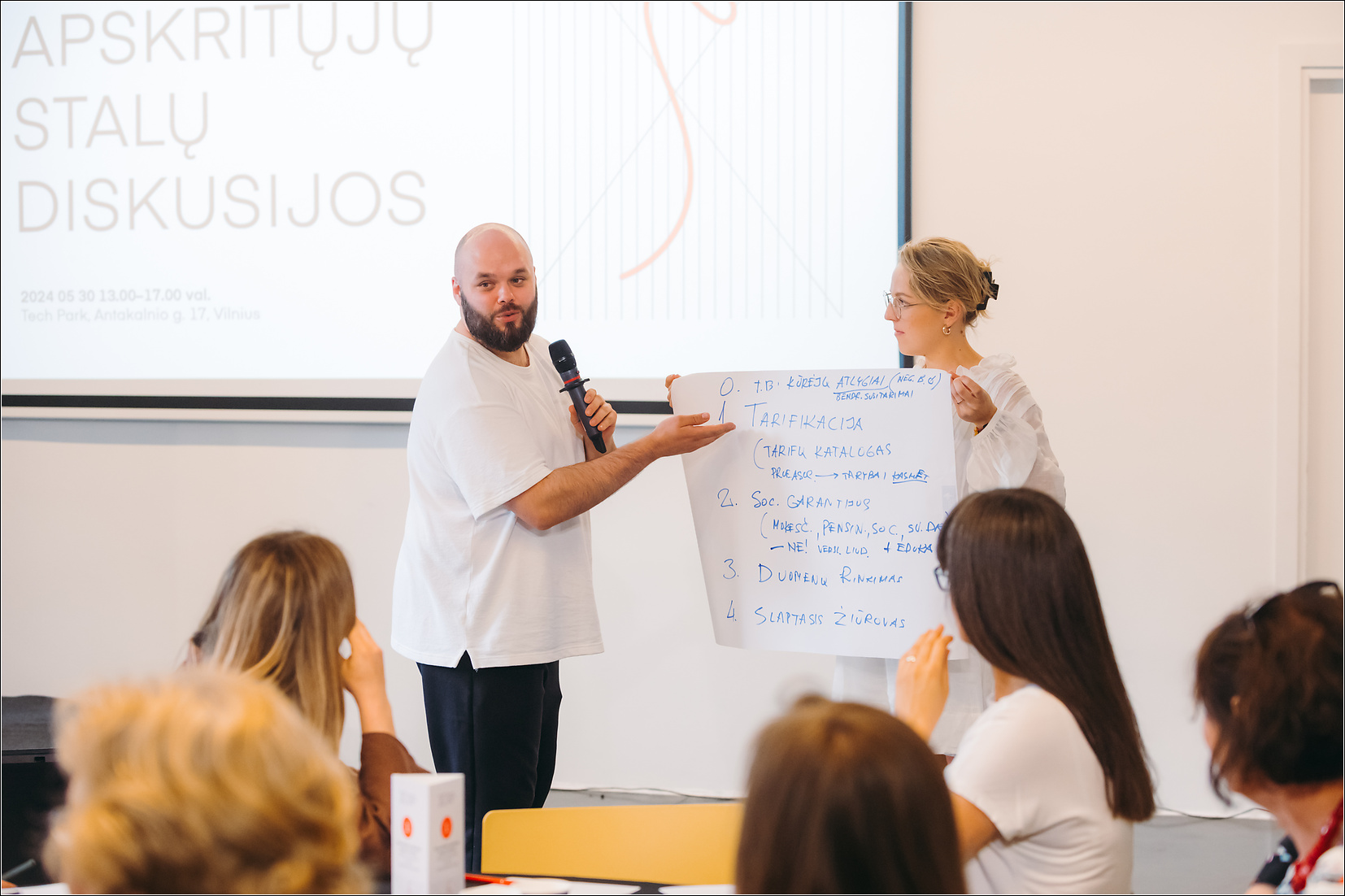
LCC Forum 2024. Photo by V. Budrys
The working group on the expectations of the cultural community discussed the importance of building mutual trust and emphasised funding specific creators rather than just their projects. The group also urged the Lithuanian Council for Culture to pay attention to mature artists and consider establishing a separate grant instrument specifically designed for individuals with extensive creative experience. The panellists emphasised the importance of funding fewer creators but providing them with more substantial financial support. They also suggested implementing a minimum threshold for creators’ remuneration in applications.
A second working group also discussed this topic. Participants argued that funding for the cultural sector should be set at 3% of gross domestic product, and suggested that the Lithuanian Council for Culture could take a more assertive stance in advocating for the sector during budget discussions. They also proposed promoting closer cooperation between cultural organisations and the Council before making decisions on changes. The panellists advocated for enhancing the competencies of organisations and creators to identify opportunities for attracting private donors. Several times during the Forum, there were suggestions to include the outcomes of previous projects in proposals. Participants in this discussion also emphasised this point. They also proposed creating a shared calendar of projects funded by the Council, which would help organisations better coordinate their activities and prevent duplication.
The working group on the principles for evaluating proposals discussed the activities of the peer assessors involved in the process. It proposed a hybrid model for peer assessment, suggesting that applications should be evaluated by both permanent and new professionals from the cultural and artistic community. The group also highlighted the importance of ensuring that those evaluating applications have access to the past results and activities of organisations and creators’ projects. The panel also discussed the criteria for evaluating applications, seeking ways to instil trust in the decisions made by the peer assessors. A second working group also discussed this topic. It focused on consolidated commentary.
In a discussion aimed at addressing whether grants serve as a long-term investment or short-term support, participants considered the motivations of creators—whether they create primarily for themselves or for the benefit of society. They emphasised the significance of long-term grants, highlighting their potential for delivering greater societal returns, and proposed the idea of group grants. The panellists emphasised that a grant should serve as an investment in the creator, fostering their self-development and growth, while also generating economic benefits for the creator. The discussion also addressed the necessity to enhance the dissemination and publicity skills of creators. Finally, the group suggested exploring methods to encourage private philanthropists to contribute at the national level, thereby diversifying funding sources for grants beyond taxpayer money.
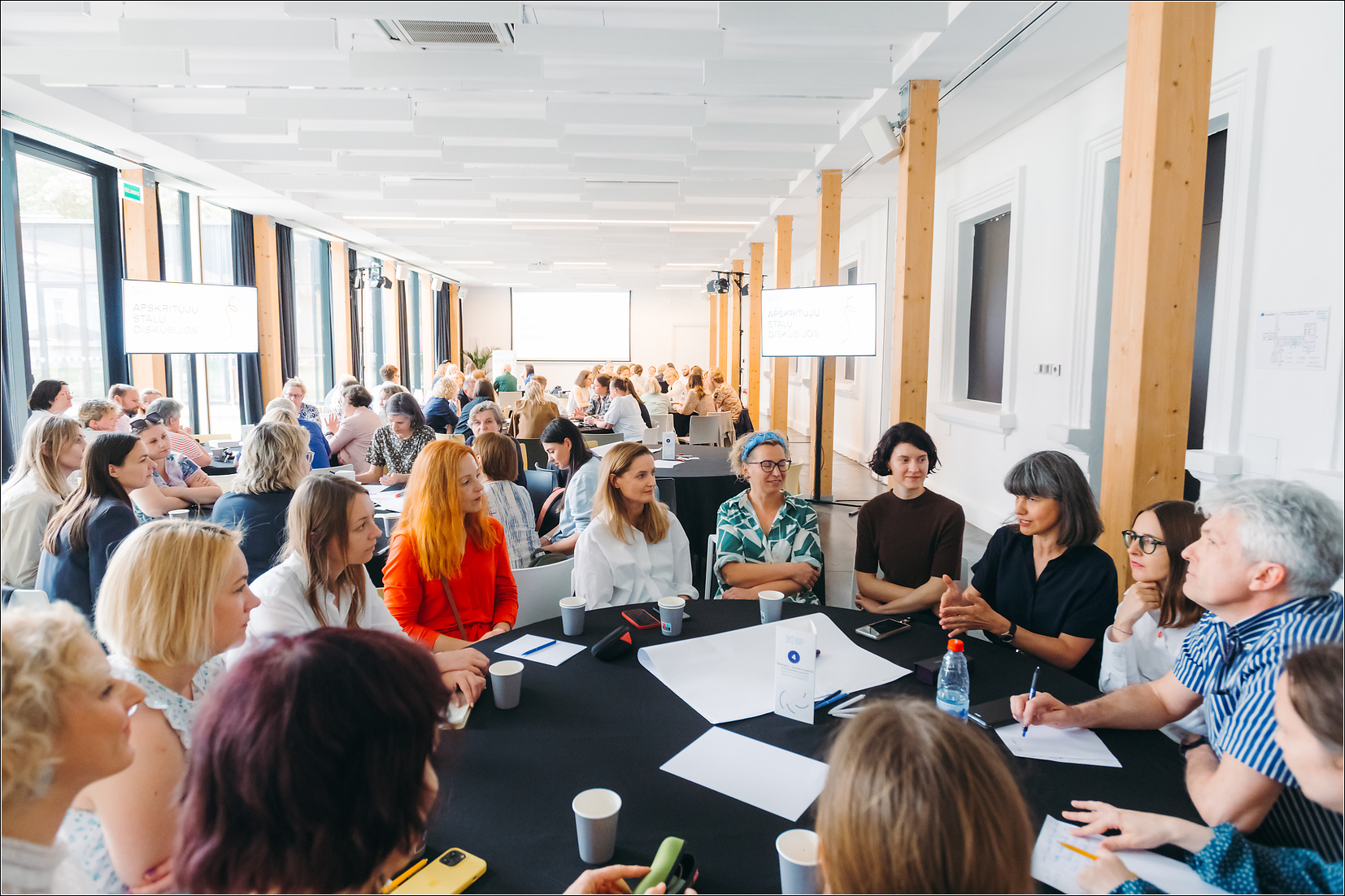
LCC Forum 2024. Photo by V. Budrys
The working group on the importance of local artists and freedom of expression argued for seeking closer cooperation between local artists, organisations, and municipalities. The panellists suggested implementing separate grants for regional and city-based creators, as well as grants specifically for promotional activities. The group also called for enhancing artists’ skills in preparing grant applications, fostering increased collaboration between managers and local artists, educating audiences by involving them in art projects, and facilitating deeper engagement with artists and their work. Finally, the group emphasised the importance of promoting freedom of expression to ensure that creators do not engage in self-censorship.
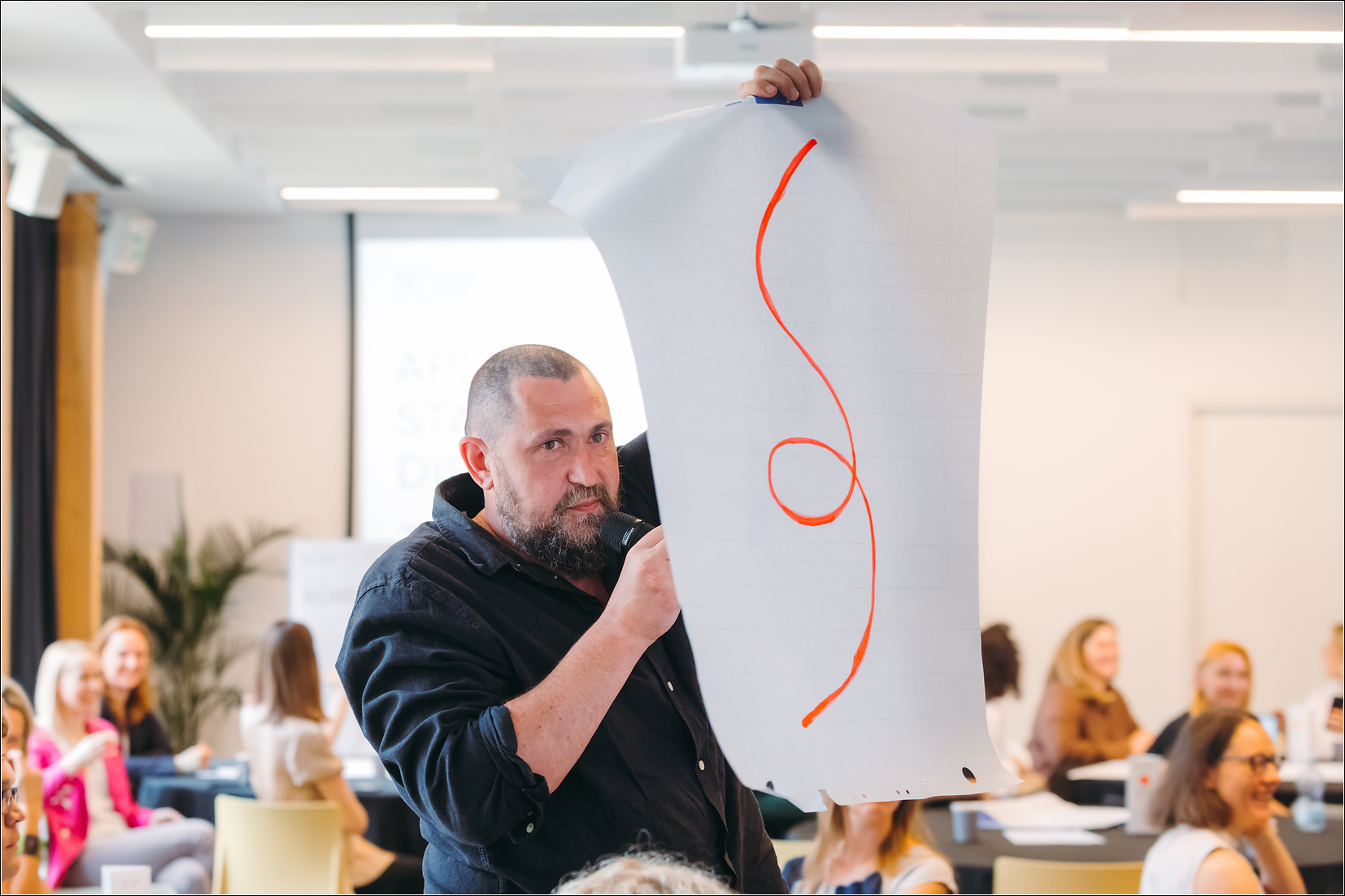
LCC Forum 2024. Photo by V. Budrys
Another working group discussing this topic pointed out that creators often work outside their profession and that creativity is often relegated to an after-work activity. Panellists suggested adopting a holistic approach to support creators, proposing that a basic income for creators should be guaranteed at the state level. This would demonstrate the state’s trust in creators, affirming that it views creators’ activities as economically viable investments that benefit society. The panellists also discussed the idea of offering different types of grants. For instance, they suggested a working grant that supports creators solely engaged in artistic activities, alongside a regular grant that allows for a combination of creative work and other activities. They also proposed encouraging more dialogue between creators and municipalities, as well as finding ways to attract creators to work in the regions.
The Lithuanian Council for Culture hopes to begin implementing some of the ideas discussed in the discussion groups in the near future, with plans to further explore and refine others. The discussions were moderated by volunteers including representatives from the Lithuanian Culture Council, peer assessors, members of the cultural community, and administrative staff. We are grateful for their efforts.